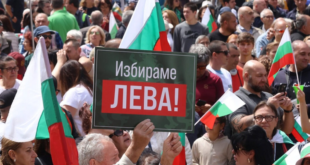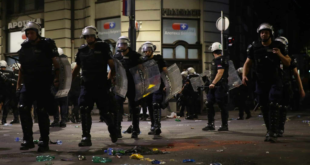Prospect of united Belgrade-backed bloc in parliament raises chance of Serbia extending its influence to heart of Kosovo’s government.
Rubin feels like a typical dive bar you can find in just about any town in Serbia. The white walls are yellowed from years of cigarette smoke and there’s little in the way of decor apart from a few Orthodox icons.
On a recent afternoon, half a dozen patrons, mostly middle-aged men, took in a steady diet of beer and cigarettes as they kept close watch on the TV. A newscast from Serbia’s national broadcaster, RTS, aired scene after scene of devastation from the recent flooding.
There was no discussing a smaller drama playing out across town, the hours of wrangling over the establishment of the new municipality of North Mitrovica, operating under the authority of the government of Kosovo.
Far from the boardrooms of Brussels, municipal leaders of the new predominantly Serbian municipality were hashing out the nuts and bolts of the EU-brokered agreement between Prishtina and Belgrade of April 2013.
The cornerstone of the agreement was bringing North Mitrovica and several other municipalities in northern Kosovo under Kosovo’s government institutions and laws after more than a decade of control from Belgrade.
The sticking point in the meeting was that representatives could not agree on whether to refer to Kosovo or Serbia in the municipal charter.
It took hours of corner powwows — including the efforts of a weary-eyed USAID official— phone calls, and cigarettes in the hallway of the makeshift municipality building, before the assembly members agreed on May 15 on which government to refer to in the statute: none at all. (An earlier draft of the statute referred future cooperation with the Republic of Serbia.)
Because of the disagreement, North Mitrovica came perilously close to having local elections for the fifth time since November.
The episode was minor in comparison to the violence that gripped the municipality before and during the elections last year. But it underscores the fact that an agreement in Brussels can only go so far in bringing Serbs into the fold of the state of Kosovo.
With these new municipalities just barely getting under way, Serbs in northern Kosovo will soon be pushed into the national political arena. Belgrade is making a push for Serbs to participate in Kosovo’s parliamentary elections and vote for a slate of candidates, the Srpska List.
Strength in numbers
The Srpska List brings together formerly acrimonious politicians: those from southern Kosovo who for years were labeled traitors by Belgrade and by many Serbs for embracing the state of Kosovo, and those from the North, who had been part of Serbia’s ‘parallel’ institutions and who opposed any acceptance, however tacit, of an independent Kosovo.
‘If we want to stay in Kosovo, we need to be all together, because we are such a small community,’ said Srpska List member Vinka Radosavljevic, from Klina, near Peja.
It is unclear just how many Serbs live in Kosovo. A common estimate is about 100,000, around 5 per cent of the population. While few in number, between a soon-to-be-formed Association of Serbian Municipalities and a united stance in parliament, the Serbian minority could wield outsized influence on the government of Kosovo, which many of them do not even recognize.
Of the 120 seats in Kosovo’s parliament, 10 are automatically reserved for Serbs, but there is no upper limit on the number of seats that Serbs can win. In the 2010 elections, Kosovo Serbs won only three seats by direct vote. As Belgrade encourages greater participation by Kosovo Serbs, analysts and leaders say that with sufficient turnout they could get around 21 seats.
In the recently dissolved parliament, a party with 21 seats would have been the third largest party after the ruling Democratic Party of Kosovo, PDK, and the Democratic League of Kosovo, LDK. Such a large bloc could make or break a governing coalition.
Kosovo Prime Minister Hashim Thaci and Serbian Prime Minister Aleksandar Vucic see full participation from the North Kosovo Serbs as in their mutual interest. Thaci has courted the Serbian minority vote aggressively and in 2011 entered into a coalition with the Serbian Independent Liberal Party, SLS, which is led by Kosovo’s Deputy Prime Minister, Slobodan Petrovic.
Petrovic’s SLS, which was always unpopular in the North and was routed in the 2013 local elections in the South, has accepted a position as number two on the joint list, which has clear backing from Belgrade.
But how the Srpska list will operate, with a mix of the SLS and other leaders who have staunchly opposed Kosovo’s statehood, is not clear.
‘Everyone has a right to make mistakes, and it is good when people who made mistakes get back on the right path in the interests of the people rather than personal interests,’ Radosavljevic said.
Petrovic also voiced optimism about the two sides working together. ‘This is the first time that we are working in a transparent way in the interests of the Serbian community,’ he told Blic newspaper.
Bekim Collaku, Thaci’s chief of staff, said he hopes there is a high turnout in the Serbian community, though he is skeptical.
‘We are interested in a high turnout of Kosovo voters regardless of their ethnic background,’ Collaku said. ‘In this regard, we encourage Kosovo Serbs to use their constitutional right and vote.
‘But ultimately, we expect from them to be constructive and make a contribution not only to promote the rights of their community, but also help to strengthen Kosovo institutions,’ he added.
Outsize influence
For Vucic, a high Serbian turnout in Kosovo will increase the influence of Belgrade in the Kosovo parliament and be a sign of strength, showing that he controls the Kosovo Serbs. It will also increase his credibility and standing in the EU.
In Serbia’s parliament, Milovan Drecun, president of the Parliamentary Committee on Kosovo and Metohija, said Serbs should participate in the Kosovo elections as this would ‘strengthen their position and influence of Serbia in the province’.
At the same session, Social Democrat Milorad Mijatovic said Serbs should have as many seats in the Kosovo assembly as possible because it would facilitate a ‘consistent implementation of the [2013] Brussels agreement, which is important for European integration.’
Nenad Rikalo, a Serbian member of the Central Elections Commission, predicts high participation among Serbs both in Kosovo and Serbia.
‘Insofar as 70,000 Kosovo Serbs vote, we can hope to have 20 or more members of parliament,’ he told KosSev, a news portal from North Kosovo. ‘When you add the number of Kosovo Serbs living in Serbia to that, the maximum we could get would be 35 seats,’ he added.
Rikalo’s projection, based on an estimate that 200,000 Serbs in Serbia have the right to vote in Kosovo, seems far-fetched, as Belgrade may struggle to mobilize such voters, especially in the aftermath of the recent devastating floods.
But, if it held true, it would mean that a Belgrade-backed slate of MPs would have more seats than Thaci’s own PDK won in the general election of 2010.
More plausible is that Srpska List is courted into a governing coalition, raising the spectre of politicians with a demonstrated loyalty to Belgrade having a say on how Kosovo’s government institutions are run.
Questions of loyalty to Kosovo have also arisen with leaders of the SLS. In 2013, Slavisa Filipovic, then the SLS deputy minister of the Kosovo Security Force, was sacked after being accused of leaking information to Belgrade.
Members of Srpska List are reluctant to speak about potential coalitions, or about which ministries they have their eyes on.
Number three on the list, Ksenija Bozovic, says her priority is only to improve the lives of Serbs in Kosovo, while Radosavljevic says she wants to facilitate more returns from Serbia to Kosovo.
Belgrade’s proxy?
Srecko Sekeljic, a political activist in Belgrade and a blogger for B92, has suggested that the new bloc will give Serbia decisive power inside Kosovo’s government.
‘The government in Belgrade would be willing and able to use the leadership of Srpska List as its proxy,’ Sekeljic claimed.
Leon Malazogu, executive director of Democracy 4 Development, a think tank in Prishtina, also says the new MPs’ bloc, and the Association of Serbian Municipalities, will give Serbia a foothold inside Kosovo’s government.
‘Now, instead of looking like a minority that needs protection, the Kosovo Serbs look like a handbrake for Serbia,’ he said.
‘But it could be dangerous if getting [the handbrake] unstuck depends on Serbia. Kosovars are not willing to put up with that,’ he said. ‘The probability that we are headed for trouble may be very high.’
Sekeljic doubts that Srpska List MPs will be powerful enough to make key decisions, such as on the country’s next prime minister, but agrees that the idea of Belgrade influencing decision-making raises concern.
‘We witnessed a Serbian mayor of North Mitrovica resigning without any reasonable justification,’ Sekeljic said. ‘Many believe Belgrade instructed him to do that, and now similar things could happen in the Kosovo government,’ he added.
Malazogu is also concerned by the idea that Srpska List, answering to Vucic in Serbia, becoming a necessary part of a governing coalition.
‘If Srpska List is needed for a majority, which Vucic controls, Kosovo basically becomes a Serbian satellite, which is what we fought against for all these years,’ he said.
Back at the Rubin bar in North Mitrovica, one patron, Radisa, seemed unconcerned when told that his local authority has formally been established within the republic of Kosovo. An occasional miner at the Trepca complex, he said he hadn’t followed local political developments lately, as he hadn’t paid his Internet bill yet. ‘I just need a simple life,’ he said.
But he also said he saw no upside for Serbs taking part in Kosovo political institutions, even if that means having more power – and he would not vote in the parliamentary elections even if he were paid. ‘Someone who is a real patriot would not sell himself for money,’ he concluded.
Nate Tabak contributed to this article.
 Eurasia Press & News
Eurasia Press & News



